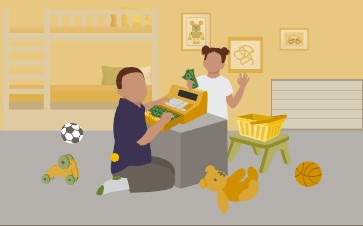Money Minded Kids

If you want your child to graduate from high school financially literate, it’s up to you to teach them the fundamentals. But how exactly do you raise a money-minded kid, and what’s the best age to start? Whether you’re trying to keep up with a toddler or track down your teen, here are some tips that can last their lifetime.
Preschool & Kindergarten
Little eyes and ears are constantly absorbing information. Set healthy examples, and they’ll be likelier to follow your lead as they get older. For example, rather than giving your little ones money, empower them to earn it. In exchange for them completing age-appropriate chores and responsibilities, you pay them a fair wage.
Children are also visual learners, so using a clear jar instead of a piggy bank to save allows them to watch their money grow. Then, you can teach them how to spend it.
Most preschoolers grasp the concept of exchanging money for goods. When they hit the store with their hard-earned cash, show them how to read price tags, practice their math and make independent choices. This allows them to exercise delayed gratification or get creative about how they spend their funds.
Elementary & Middle School
Kids between 6 and 10 years old typically understand the difference between wants and needs. But advertising is always there to make them want more. When a big-ticket item inevitably catches their eye, suggest picking up extra chores that could earn them more money. If they’re especially eager, you can also introduce them to the concept of using their money to earn more money. By investing their earnings in a lemonade stand, for instance, your child could multiply their savings.
Before you know it, your child will use their creativity to think of new ways to make extra money, like dog walking, bake sales and babysitting. Adding another source of income is a great way to start conversations about cash flow, investments and entrepreneurship.
High School and Beyond
The key to continuing your child’s financial education into high school is resisting the impulse to hand over spending money. In other words, leave them wanting more. Chances are your child will blow through their money once or twice. They’ll give in to the temptation of a cool new gadget or a trendy outfit as we all have at some point. But experience is the best teacher, and when your teen finds themselves cashless, they’ll learn their lesson.
Even young adults appreciate a financial plan. With few financial responsibilities and endless fun ways to splurge, the teen years are prime time to double down on goal setting. Be sure to help them open a checking account with debit card, and once they’re old enough to start earning money outside the house, they can really start building their savings and even consider an investment account.
Talk to them about the power of compound interest. Set up a time for them to meet with your financial advisor and give them a head start on their path to financial freedom. By instilling financial literacy from a young age, you’re giving your child a true gift of a lifetime.


